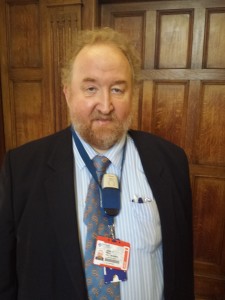
This group of MSc s is still the only one available anywhere in the world completely online.
Its origins go back into the mists of time or at least to the mid to late 1990s. The educational environment was very different then. Most distance learning was still carried out using a text based correspondence course model, and even the Open University, Britain’s leading pioneer in distance learning had most of its courses using this model with students being sent a box full of textbooks and notes when they initially signed up to a course.
MOOCs, of course had not even been thought of, and to be honest most computers were used as glorified typewriters or for playing games by adolescent youths.
Oncology did have formal postgraduate courses and there were several MScs in oncology across the country, based at some of the larger oncology centres but they tended to have small numbers of students, were primarily aimed at medical graduates, and did not fit in awfully well with the model of medical postgraduate education, which at that time and still is through vocationally based Royal College diploma courses ending up with a completed certificate of training.
These regional MScs associated with universities also suffer from problems with capacity and demand with some years there being very few students wishing to do the course and other years a lot more, making future planning difficult.
A few years after taking up appointment in Newcastle, I was asked to look at the possibility of setting up a Newcastle MSc, but rather than using the model in place at the time, I and some colleagues explored the possibility of an online course which should to some extent reduce the capacity and demand problem, be scalable and accessible to a greater number of students throughout the UK and indeed the world.
Another consideration which we took very seriously, was the realisation that the great majority of students taking these courses would be in either part-time or full-time employment, and they would appreciate the benefits of online learning which they could do, fitting in with their employment and family life and not taking them away from their place of work. We were also very keen to have multi-professional access to the course, to a much greater extent than other oncology MScs
So as a small group we moved on to developing the MScs as a solo project and, by this time, Dr Graham Dark, , had joined the consultant body at, as was then Northern Centre for Cancer Treatment, Newcastle General Hospital.
Looking back, I think, in the beginning, we were incredibly naive (and to be truthful, naïvely stupid, in a good way) and this actually helped us. I think if we’d sat down and thought about all the potential obstructions and challenges, the courses would never have got off the ground. We did have a certain “Bob the builder” attitude – can we do it, yes we can!
The courses are now flourishing and developing further streams, and we have a great team, and I think it would be fair to say happy team, which is important to us
Maybe in years to come, a University archaeologist will dig deep into the paperwork in my office (notoriously overstuffed and disorganised) and find the documentation from the very start of the course, the “big bang” moment.
My experience of the course, has been both enjoyable and very fulfilling. I particularly enjoy when our students come in person for graduation in Newcastle, knowing this is the only time they have actually been in Newcastle, and that they are here voluntarily, because the course has given them the flexibility of completing it from wherever they live and work, and they’re coming to Newcastle to mark, I hope, one of the red letter days in their lives.
I suppose the only advice I can give from the course is that if you think you have a good idea, hold onto the naive stupidity and go for it, thinking why not do this rather than listening to all the naysayers telling you the 17 reasons why it won’t work.
Continue to enjoy the courses!
Dr Charles Kelly